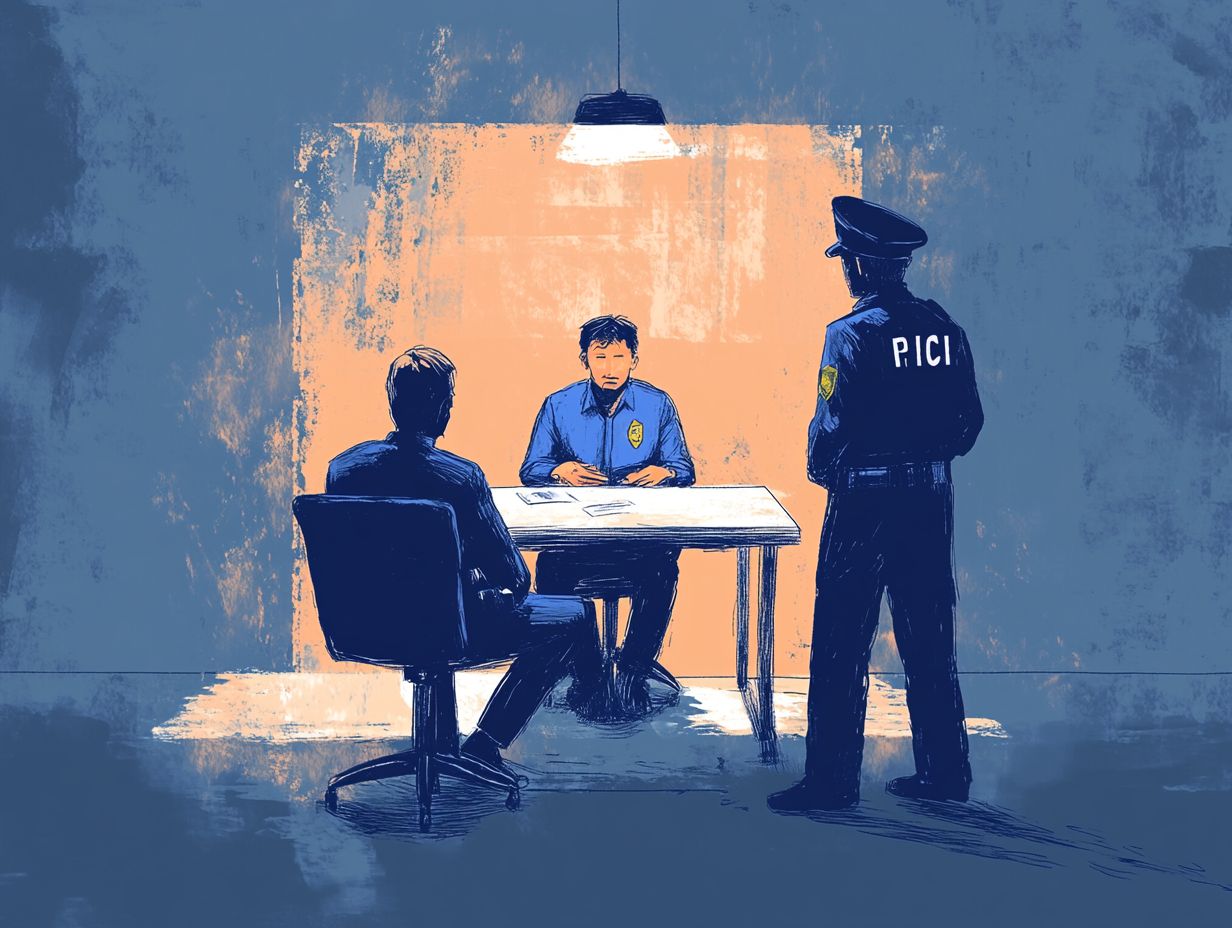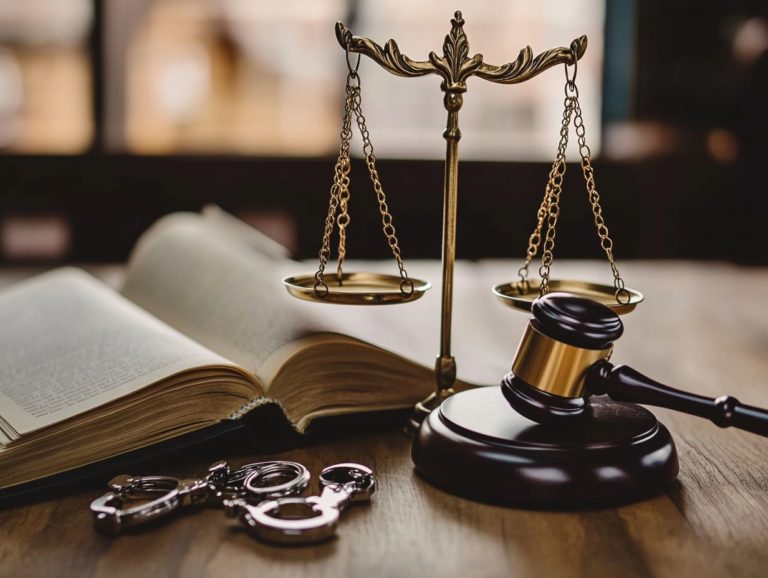How to Handle Police Interrogation?
Navigating a police interrogation can feel like stepping into a high-stakes arena, rife with uncertainty and tension.
Understanding the intricacies of what a police interrogation involves, knowing your rights throughout the process, and preparing effectively can significantly empower you in these situations.
This article carefully unpacks the essential elements of police interrogations, from identifying common tactics employed by law enforcement to offering practical advice for maintaining your composure and asserting your rights.
Arm yourself with the knowledge necessary to approach these high-pressure encounters with confidence and poise.
Contents
Key Takeaways:

Know your rights as a suspect during police interrogation. Stay calm and assertive while asserting your rights during interrogation. Familiarize yourself with common tactics used in police interrogation and how to respond to them.
Understanding Police Interrogation
Understanding police interrogation is essential for anyone who might face questioning as a suspect. This structured process, used by law enforcement, aims to gather information, evaluate a suspect’s credibility, and potentially get a confession or other valuable statements.
The dynamics of interrogation can shift dramatically based on the tactics used by the police and the legal rights you hold, including your right to remain silent and to seek legal representation.
Being informed about these elements can empower you in what could be a daunting situation.
What is Police Interrogation?
Police interrogation encompasses the techniques and methods employed by law enforcement to question a suspect regarding a crime. You might encounter open-ended questions designed to elicit detailed responses or more direct approaches that aim to prompt admissions of guilt.
Authorities often use audio or video recordings during interrogations, capturing the entire process while ensuring transparency and accountability. It’s essential for you to grasp the legal parameters surrounding these techniques, including your rights to remain silent and the necessity of having legal counsel by your side.
This framework significantly influences the admissibility of any evidence collected, underscoring the critical importance of conducting interrogations ethically and within the boundaries of the law.
Rights During Police Interrogation
Understanding your rights during interrogation is crucial for ensuring fair treatment and robust legal protection.
This is particularly important under the Fifth Amendment, which protects you against self-incrimination.
Your Rights as a Suspect

As a suspect, you possess several critical rights that must be upheld during police interrogation, including your right to legal counsel and your right to refuse to answer questions. These rights are essential safeguards against coercive practices that could lead to wrongful convictions.
It’s important to consult with a defense lawyer before engaging with law enforcement. Legal representatives are skilled at navigating the complexities of the justice system and can provide valuable guidance on how to best protect your interests.
During interrogations, police are required to clearly articulate your rights, commonly known as Miranda rights, which inform you that you can remain silent and have a lawyer. Officers must document the process to demonstrate compliance with legal standards, thereby preserving the integrity of your rights throughout the questioning.
Preparing for Police Interrogation
Preparing for a police interrogation involves understanding the intricacies of the process and mastering the art of maintaining a composed demeanor while confidently asserting your rights.
This approach can profoundly impact the outcome of the questioning.
Don’t leave your future to chance understand your rights today!
What to Expect and How to Prepare
When preparing for a police interrogation, it s vital to understand what lies ahead, including the types of questions you might face and the tone that police will adopt during the interview.
During these sessions, law enforcement may utilize various tactics aimed at extracting information from you. They could ask open-ended questions that invite detailed responses or employ leading questions that subtly imply guilt. Expect a confrontational approach at times, as they may adopt a tone designed to pressure you into confessing or revealing the narrative they have constructed around the situation.
Mental preparation for such encounters is essential, as is seeking legal counsel to grasp your rights and the implications of any information you choose to disclose. Legal advice protects you and ensures you understand your rights during questioning while helping you navigate the complexities of the situation and avoiding pitfalls that could jeopardize your standing.
Handling Police Interrogation
Successfully navigating a police interrogation requires you to employ clear and confident speaking strategies that safeguard your rights during interrogation.
Remain composed and manage any emotional reactions that may surface during the questioning process.
Tips for Staying Calm and Asserting Your Rights

Staying calm during police questioning is essential. Employing assertive communication helps ensure that your legal protections are upheld.
In stressful situations, focusing on your breathing can be an effective grounding technique, allowing you to maintain composure and think clearly. Remember, you have the right to remain silent; invoking this right can provide invaluable time to consult with a legal representative.
Using clear and respectful language demonstrates your confidence and helps de-escalate potential tension. Phrases like, “I would prefer to speak with my lawyer before answering any questions,” effectively articulate your boundaries, setting a tone of assertiveness while ensuring that your legal protections remain firmly in place.
Common Tactics Used in Police Interrogation
Understanding common tactics employed during police interrogations is essential for identifying manipulative techniques that may be utilized to coax a confession or statement from a suspect. This awareness equips you with the insight needed to navigate such high-stakes interactions effectively.
Recognizing and Responding to Manipulative Techniques
Recognizing manipulative techniques during police interrogations is crucial for responding appropriately and safeguarding your rights against coercive tactics. These tactics may involve deception, where interrogators present false evidence to elicit confessions, or intimidation, characterized by aggressive questioning designed to instill fear.
Stay calm and aware of your surroundings, paying close attention to the language used while maintaining composure, even under pressure. By being informed about these strategies, you can understand that exercising your right to silence or requesting legal representation is not only valid but necessary, enabling you to resist manipulation.
Recognizing techniques like the ‘good cop, bad cop’ routine will help you differentiate between genuine concern and coercion, allowing you to navigate the situation with confidence.
Preguntas Frecuentes
-
Qu es un interrogatorio policial?
Un interrogatorio policial es un proceso formal en el que los oficiales de la ley interrogan a un individuo sospechoso de cometer un crimen con el fin de recopilar evidencia y obtener una confesi n.
-
Tengo que responder preguntas durante un interrogatorio policial?
No, tienes el derecho a permanecer en silencio durante un interrogatorio policial. Puedes optar por ejercer este derecho y no responder ninguna pregunta hasta que tengas representaci n legal presente.
C mo debo comportarme durante un interrogatorio policial?
Mant n la calma y s respetuoso.
Evita ser defensivo y atente a los hechos.
Recuerda tu derecho a permanecer en silencio.
Qu debo hacer si me siento intimidado o presionado?
Si te sientes presionado, pide un abogado o termina el interrogatorio.
Conocer tus derechos es crucial. No debes responder preguntas que te incomoden.
Debo decir la verdad?
Tienes el derecho a permanecer en silencio.
Consulta a un abogado antes de decidir qu decir.
Puedo ser detenido?
S , puedes ser detenido si hay sospechas de un crimen.
Si no est s arrestado, puedes irte en cualquier momento, a menos que seas requerido como testigo o para identificarte.







